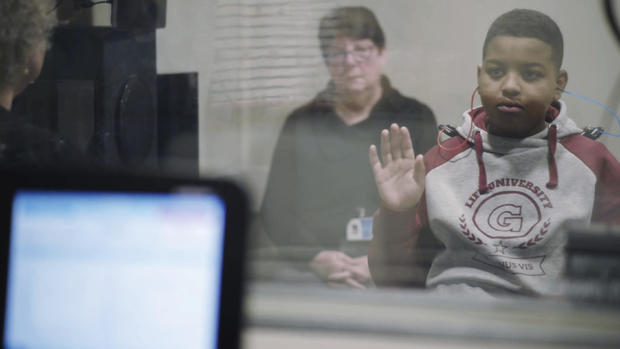Experimental gene therapy helps treat kids with inherited hearing loss
Experimental gene therapy studied in both China and the United States has allowed several children born with inherited deafness to hear.
On Tuesday, the Children's Hospital of Philadelphia announced improvements in the hearing of an 11-year-old boy, Aissam Dam of Spain, who was born unable to hear. After being treated at the hospital in October, he became the first person to get gene therapy in the U.S. for congenital deafness.
The hospital — one of several sites in a test sponsored by a subsidiary of Eli Lilly called Akouos — reported Dam heard sounds for the first time. Though the sound is muffled, like he's wearing foam earplugs, he's now able to hear his father's voice and cars on the road.
"What we have really accomplished is exciting because it's the first time hearing has been restored in a child — really in a human being — for a hereditary type of hearing loss," Dr. John Germiller of the Children's Hospital of Philadelphia told CBS News. "We've always wanted to be able to restore natural hearing, and we've been waiting 30 years for this... and its finally here and that's restoring a defective gene you're born with."
A small study, published Wednesday in The Lancet, also documented significantly restored hearing in five of six kids treated in China. And earlier this month, Chinese researchers published a study showing much the same in two other children.
Preliminary results from other research has also been positive. New York's Regeneron Pharmaceuticals announced in October that a child under 2 in a study it sponsored with Decibel Therapeutics showed improvements six weeks after gene therapy.
Columbia University's Dr. Lawrence Lustig, who is involved in the Regeneron trial, told the Associated Press that although the children in these studies don't wind up with perfect hearing, "even a moderate hearing loss recovery in these kids is pretty astounding."
Globally, 34 million children have deafness or hearing loss, and genes are responsible for up to 60% of cases.
Hereditary deafness is the latest condition scientists are targeting with gene therapy, an approach that has already led to approved treatments for illnesses such as sickle cell disease and severe hemophilia.
Children with hereditary deafness often get a device called a cochlear implant that helps them hear sound.
"No treatment could reverse hearing loss... that's why we were always trying to develop a therapy," Zheng-Yi Chen of Boston's Mass Eye and Ear, a senior author of the study published Wednesday, told the AP. "We couldn't be more happy or excited about the results."
How does the gene therapy work?
A Children's Hospital of Philadelphia surgeon developed a cutting-edge, minimally invasive endoscope that allowed the gene therapy to be surgically placed directly into the inner ear.
"The idea here is to replace a defective gene that a child is born with, restore that gene to the inner ear by literally injecting it into the inner ear," Germiller says. "It's a surgical procedure to do that, but it's exciting because if we can get the gene back in and get it functioning, it should restore hearing."
All the children in the experiments have a condition that accounts for 2% to 8% of inherited deafness. It's caused by mutations in a gene responsible for an inner ear protein called otoferlin, which helps hair cells transmit sound to the brain. The one-time therapy delivers a functional copy of that gene to the inner ear during a surgical procedure. Most of the kids were treated in one ear, although one child in the two-person study was treated in both ears.
What's next for gene therapy targeting deafness?
So far, the experimental therapies target only one rare condition, but many hope this research could eventually help more kids with other types of deafness caused by genes.
And despite improvements with no major side effects, Chen says questions about the therapy still remain, such as how long the therapies will last and whether hearing will continue to improve in the kids.
Some people also consider gene therapy for deafness ethically problematic.
Teresa Blankmeyer Burke, a deaf philosophy professor and bioethicist at Gallaudet University, said in an email to the Associated Press that there's no consensus about the need for gene therapy targeting deafness. She also pointed out that deafness doesn't cause severe or deadly illness like, for example, sickle cell disease. She said it's important to engage with deaf community members about prioritization of gene therapy, "particularly as this is perceived by many as potentially an existential threat to the flourishing of signing Deaf communities."
But researchers said their work is moving forward.
"This is real proof showing gene therapy is working," Chen told the outlet. "It opens up the whole field."




